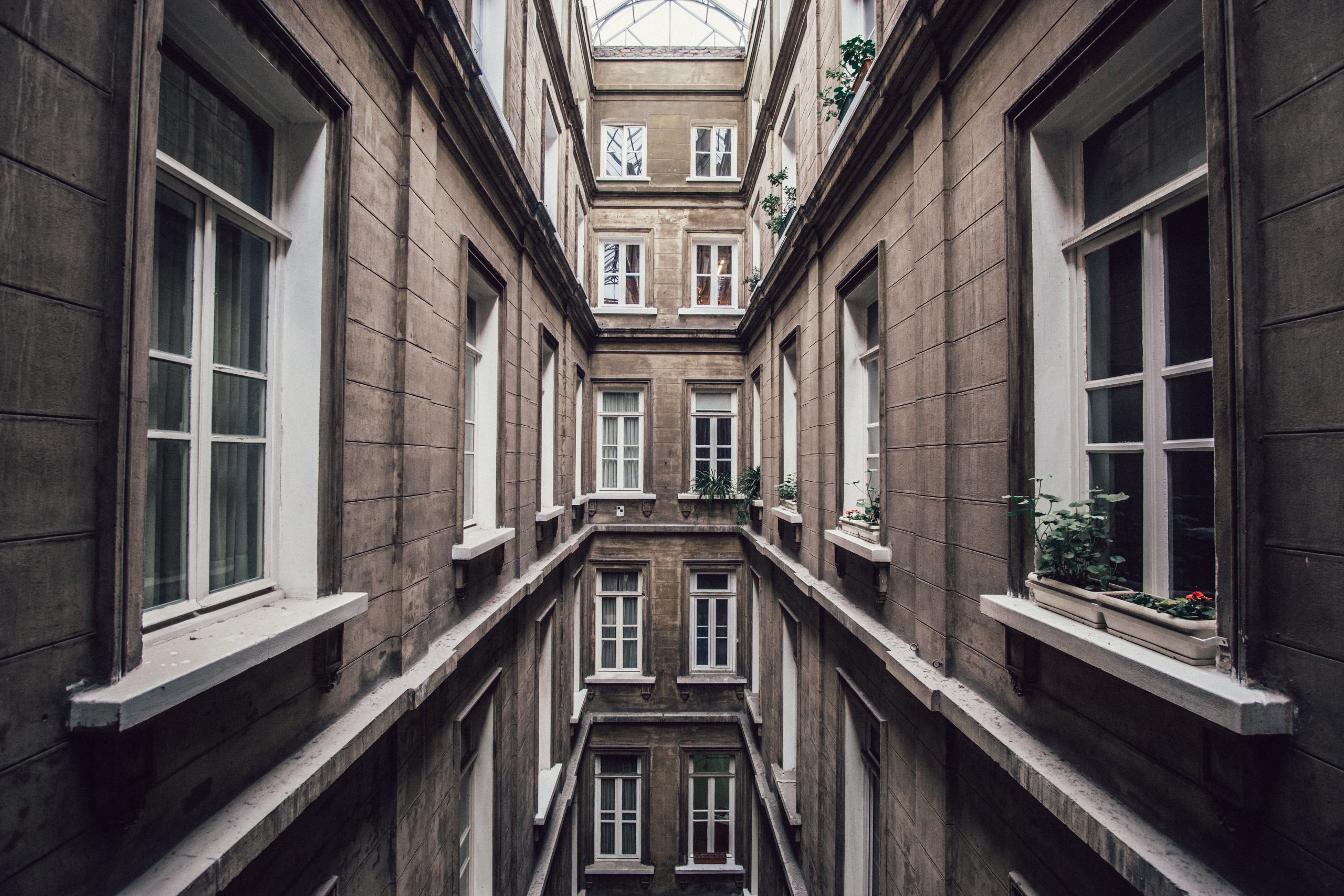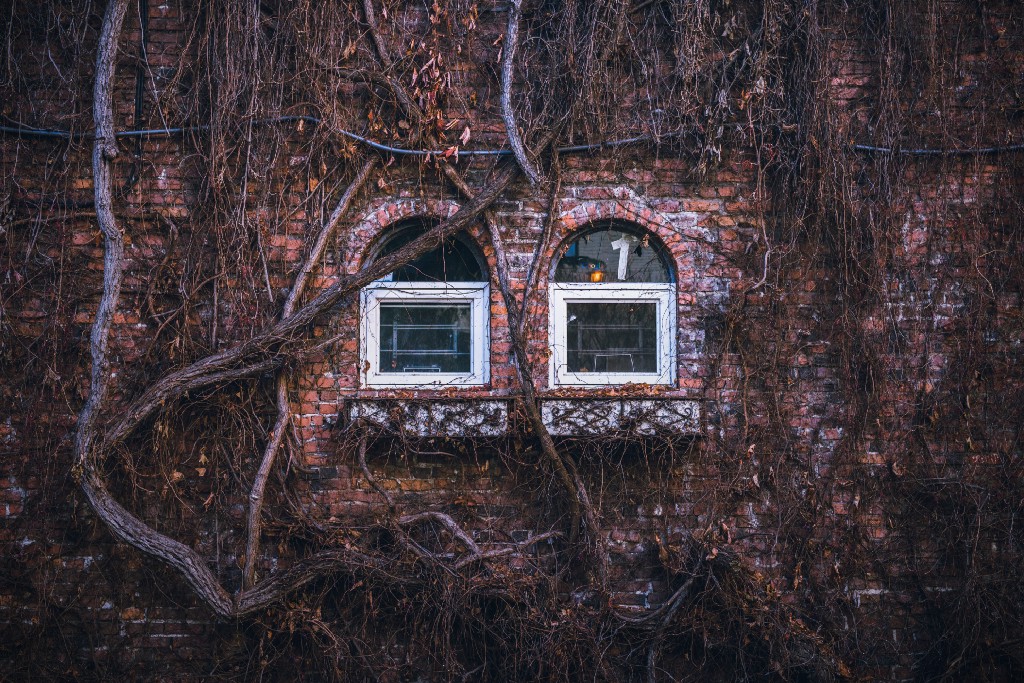Lit Mags
Literally Squeezed Out of the Market
"Skinny House," a short story by Kim Samek

Literally Squeezed Out of the Market
Skinny House
The houses are getting skinnier. By the time Ant can afford to buy one, there is only enough room to stand. His elbows bump up against the walls. His nose hits the front door. He goes outside whenever he has to take a deep breath. He spends a lot of time on his porch listening to The Smiths, but it is worth it to own his home.
Most of his neighbors have bigger houses. They moved in decades ago, before the subdivisions. He is stuck in an upright coffin, but he is proud of his home.
He copes with the lack of real estate by staying longer at work. His office is both tall and wide, with a nice view of downtown and plenty of room to stretch his legs. His job requires him to compile the best books and best microwaves and best beaches into lists. He used to write longer articles, but his company wanted him to make them shorter. Some of them are only twelve words long. He writes many lists so he can stay late. The space makes him feel relaxed. He leaves only to sleep. This makes his new house tolerable.
It all goes well until they make him work from home. Now Ant is stuck in his skinny house. Sometimes the teenagers tip his house. They think it’s funny to tip houses like cows. The houses are so skinny—who could resist? He hopes he’ll be allowed back into the office again soon—it’s hard to work under such conditions—but that day doesn’t come. A couple years pass, and he gets sick of being in his skinny house.
He dreams of moving out of Los Angeles—maybe out to the desert. But it would be a big change for him. He grew up in the city. It is all he knows. He went to college here too. He will miss his family and friends, but he needs a place to sit.
So he packs up. It doesn’t take too long. He doesn’t have many possessions. He wraps his screens in bubble wrap, and then he is done.
But he is on to greener pastures: a desert ranch. Now he has dozens of acres. He can stretch his legs. The first few months he walks his property just so he can bask in the hugeness of what his money has bought. There’s no fence, so he decides to build one. It takes him a while to mark up the boundaries of his property, but there are no neighbors fighting to regain the inches he’s fudged, so he takes a few more.
Even though his new house has six rooms, he spends much of his time sitting on the porch so he can be seen. He wants to feel like somebody. But nobody passes by.
And then he realizes there’s a problem because he has a huge house and doesn’t feel like somebody. He doesn’t feel like somebody because he doesn’t know anyone. He was happier in a skinny city house, he thinks. He has made a mistake. He misses his friends. It is lonely out here. He feels depressed for a few more years, but at least his property value ticks up. He has outpaced inflation. His financial advisor sends screenshots from Redfin. Good work, she says. By the time he returns to Los Angeles, the houses are even skinnier. He can’t fit inside most of them. He wishes he bought a house decades ago—back when they were a normal size.
Eventually he finds a house he can fit in, but it is under a freeway and there is no light. The realtor tells him it will go fast. It is the widest house available in his price range. It would be foolish not to buy it. He makes a good offer that’s accepted.
He likes his new house, but it is noisy living under the freeway—so many cars buzzing overhead, not enough of them electric. He dreams of moving into the old office where he could have twenty-two bathrooms. He dreams of living in a building so large an elevator is required to reach the top floor.
He enquires about returning to the office, but his boss tells him they’ve let go of it. A corporation has converted the old building into thousands of new homes, but these were built too skinny, so the building remains uninhabited. A crime, Ant thinks. Imagine what one could do with all that space. The building remains empty for months and nobody does anything about it even though there is a housing crisis. He passes by it sometimes and stares longingly, thinking of the long aisles and the nice views from his old desk. He would give anything to stroll those aisles again, to feel like a person who has been freed from his packaging.
How could they let the building stand empty when so many need a place to live? He dreams of taking a sledgehammer to the walls and converting the building back into one office space. At first he is joking, but then he thinks maybe he should take matters into his own hands. The space is going to waste. It is only common sense. Buildings are for living in. If he doesn’t knock down the walls, who will?
He waits until midnight to break in and dons a black ski mask. How it’s done in movies, he thinks. He has no experience with break-ins. He is just a regular guy who writes lists for a living. The sledgehammer is heavy. It takes longer than expected to knock down a wall, but he is proud when he does it. Later, he falls asleep on the ground. He is happy to sleep horizontal for once. He sleeps in an X shape on top of the rubble, taking up maximum space. When he wakes up there are police standing over him. They haul him away to a jail cell that is fatter than his house. It is fat enough for him to pace. He can get a lot of work done in here. He continues working from home from his jail cell. Later, he is convicted on all counts. Prison is bigger than his jail cell, much bigger than his house. He receives a promotion while working from prison.
A couple years later, when he gets out, he finds his house tipped. He climbs inside and tries to die, but this doesn’t happen, so instead he lies perfectly still with the front door open so he can look up at the sky. But he can’t see the sky through the freeway, so he spends the next few months trying to drag his house out. It’s hard work, but he feels great once he’s finally out from under the freeway. Now his house is full of light. But the stars are missing from the night sky. He can’t see them because of the city lights. It would be nice to see the stars at night.
So he spends the next few years pushing his house out to the desert where there are no lights to pollute the view. It takes a long time—a few decades, an inch at a time—but finally he gets it there. Now he can see the stars, but he can’t see any of his friends and he is too old to push his house back home. He is stuck in the desert. He lies between the Joshua trees thinking of his old ranch. If he’s going to live in a place that’s so lonely, then why in a house so small? He should have stayed at his ranch. He thought he was a practical person, but he has ended up with the least logical choice: a tiny house in a huge open space. And now he is an age at which a person must accept his choices.
The city eventually fixes the skinny houses problem. The houses are very tall now as if to compensate. Still not much breathing room, but plenty of space for one’s things. Most people live on the bottom floor and store their possessions in the levels overhead. They retrieve their items from the outside, through their windows with a metal claw like in a children’s prize machine. Actually this is more of a solution for corporations who need to sell them things. Still, it would be nice to have one of those houses with the claws. He dreams of the things he would retrieve from his top floor, all the things he could buy with his money, if only he had space.
But he is grateful for his skinny desert house. He makes a list of what he likes:
The Little Dipper
Hikes through Joshua trees
Quiet except for the birds and the wind
He has done alright, he thinks. If he had a tall city house, he would spend all day buying things on his screens. Instead he spends his time with his toes in the dust. Sometimes he takes long walks and forgets he is a person—that he is not the wind and the rocks and the trees. He takes the deepest breath he has taken since he bought his first skinny house and looks up at the sky and he forgets what it feels like to be contained.








